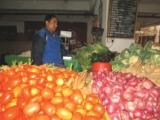by Nita Nirash
Sikkim the state with only 7096 sq km of total
land area is on its way to become an Organic state by the year 2015.The state
Govt. has launched the Organic Movement which is now being carried out
seriously. Launching the mission in 2010 Chief Minister, Pawan Chamling,
highlighted some of the reasons behind the Sikkim Organic Mission. He said, “Our
hilly state is dependent for food commodities, specially vegetables and fruits,
on outside State supplies to some extent. As a result money does not go to our
farmers and there are issues about the safety of food to consumers. We want to
reduce dependence of the consumers of the state for vegetables and fruits on
outside state supplies in order to help our farmers benefit from the consumer
boom and discourage Sikkim becoming a consuming society, particularly when rural
population starts moving away from farming. It will benefit farmers and state if
they could diversify farming and in this regard increasing access to Sikkim
farmers Organic produce in the local markets, which will serve a meaningful
purpose. Organic Mission will be beneficial to all citizens of state in terms of
health and wealth, but also for our precious land, water resources and
ecology.”
| Organic Farming is a process in which Chemical fertilizers and pesticides or any other kind of chemical inputs are avoided |
Organic Farming is a process in which Chemical
fertilizers and pesticides or any other kind of chemical inputs are avoided.
These are replaced by Organic inputs and Organic sources of soil nutrients.
However, scientists & researchers differ on Organic food being healthier
than the other one. Recent researchers from Stanford University, USA, after
conducting research pointed out that “Eating Organic fruits & vegetables can
lower exposer to pesticides, including for children- but amount measured from
conventionally grown produce was within safety limits.” They also are of the
opinion that even insecticides used inside homes resulted in the presence of
pesticide level in urine of children examined. So it can be said that if we want
to be within safety limits for our internal system, it has to be complemented
& supplemented by equally beneficial products, when it comes to atmosphere
& environment within the four walls of our houses.
According to the Economic Survey Report, Govt. of
Sikkim, (2006-7), “Fertilizer consumption was over 3000 tones in 2001.The per
hectare consumption of fertilizers has been steadily going down. In fact, Sikkim
with a per hectare consumption of 5.8kg is the least fertilizer using State in
the whole of North East, except for Arunachal Pradesh and Nagaland.”
Present scene is different from what it was in
2006-7, during the Plan. Now, the Govt. is steadily moving on the track of
Organic Mission 2015. Prior to launching of the Mission –’15, total 8128
hectares of certified land was already in existence. A 50 Thousand acre land,
which remained to be converted, is being changed into an Organic area phase
wise. This process will bring all the agricultural land under Organic system and
Certified.

Organic Food Market at Sikkim
For having proper Organic Farming, giving up
chemical fertilizers is not enough, as there are many more strings attached to
it. The seeds have to be totally organic also. So, the concerned department has
been breeding seeds and testing too. Efforts are being made to produce seeds
organically.
Do people prefer buying Organic produce? The
Organic produce appears to be a bit expensive, but tasty, nonetheless. It is
said to be better than conventionally produced food items, the fruits are said
to be sweeter, also. On visiting the Khangchendzonga Shopping Complex, in the
capital, Gangtok, one finds the stalls selling Organic Vegetables & Fruits,
flourishing like any other. Youth having formed Cooperative Society for selling
the organically grown produce are happy with their income, but they think that
consumers should be made more aware about the benefits of Organic Food. There
are stalls selling Organic food from both Sikkim as well as Siliguri.
All that is produced in harmony with nature is
naturally healthier and tastier compared to conventional type of items. The
Organic food is also said to be lower in nitrates and antioxidants. The health
hazards and risks like cancer and nerve problems caused due to chemical
pesticides at times can also be reduced by consumption of Organic food.
The state has adopted the most authentic
certification system, which has been accepted by the European Union, Switzerland
and USDA. Group Certification and Participatory Guarantee System can also be
accepted in future, though it is acceptable in domestic market only. The
Certification process takes around three years.
The persons, who have switched over to proper
Organic Farming, have all the joy of beautiful birds and insects chirping and
singing in their farms. Some animals are also expected to be back to their
original habitats.
No comments:
Post a Comment